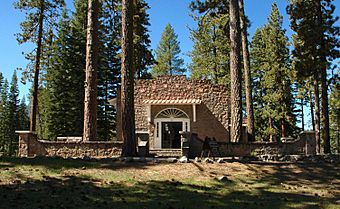Loomis Museum facts for kids
Quick facts for kids |
|
|
Loomis Visitor Center
|
|
|
U.S. Historic district
Contributing property |
|
 |
|
| Location | Lassen Volcanic National Park, Shingletown, California |
|---|---|
| Area | 1 acre (0.40 ha) |
| Built | 1927 |
| NRHP reference No. | 75000177 |
| Added to NRHP | February 25, 1975 |
The Loomis Museum, also called the Loomis Visitor Center, is a special building located near Manzanita Lake in California. It sits just outside Lassen Volcanic National Park. This museum was built in 1927 by a man named Benjamin Franklin Loomis.
Benjamin Loomis was a local homesteader and a photographer. He took many pictures of the 1915 eruptions of Lassen Peak. His work was very important in helping to create Lassen Volcanic National Park in 1916. In 1929, Mr. Loomis gave the museum and about 40 acres of land around it to the National Park Service. Since then, the building has been used to teach visitors about the park.
Mr. Loomis had hoped that the main office for the new park would be at Manzanita Lake. However, the Park Service chose a different spot. So, Benjamin Loomis and his wife, Estella, decided to build their own museum. They wanted to show photos taken by Mr. Loomis and others. They also displayed geological exhibits and items from local Native American groups. The museum was opened on July 4, 1927. It was named the Mae Loomis Memorial Museum, in memory of their daughter, Luisa Mae Loomis, who had passed away in 1920.
What the Museum Looks Like
The Loomis Museum is a one-story building shaped like a rectangle. It is made from local volcanic rock. The main part of the museum is about 25 feet wide and 60 feet long. It has small sections that stick out at the back, making the building look like a "T" from above.
The building has unique stepped walls at the top, which look like castle battlements. The main entrance is fancy, with windows on the sides and a rounded window above the door. A small roof hangs over the entrance. The sides of the building also have similar small roofs, all covered with green tiles. Inside, the museum is mostly one large room.
The Seismograph Building
About 45 feet northeast of the museum is a smaller building. It looks similar to the museum and is about 10 feet by 12 feet. This building is a seismograph station, which means it holds equipment that measures earthquakes. The Loomises built this station in 1926. It has three large windows so visitors can see the earthquake-measuring tools inside.
History and Importance
The Loomis Museum and the seismograph station were added to the National Register of Historic Places on February 25, 1975. This means they are recognized as important historical sites. The museum was updated in 1994, and the seismograph building was updated in 1995. Today, the National Park Service uses the museum as a visitor center. It helps people learn about the park and its history. Both buildings are also part of the Manzanita Lake Naturalist's Services Historic District.
Images for kids
 | Kyle Baker |
 | Joseph Yoakum |
 | Laura Wheeler Waring |
 | Henry Ossawa Tanner |





